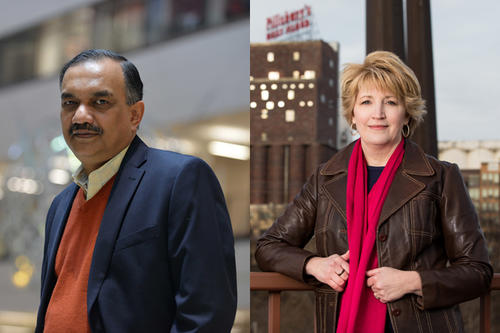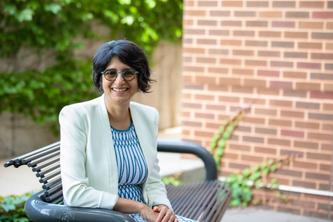
Five years ago on April 24, the Rana Plaza building—which housed several clothing factories—collapsed near Dhaka, Bangladesh. More than 1,100 people died in the worst disaster in garment industry history.
With many of the goods produced in those factories bound for North American and European retailers, it sparked concern from consumers about the dangerous working conditions garment factory workers sometimes face.
Kingshuk Sinha, a professor in the Carlson School of Management, and Susan Goldstein, an associate professor in the Carlson School of Management, have studied the implications of the Rana Plaza building collapse on designing and sustaining socially responsible supply chains, and improving factory working conditions in developing countries. Both are available to comment on how the tragedy changed how businesses buy products.
Kingshuk Sinha, Ph.D.
“Bangladesh plays a critical role in the global supply chain of ready-made garments—it’s the third largest exporter to the U.S. and the second largest overall exporter in the world. Bangladesh’s efforts over the last three decades to develop its ready-made garment industry has resulted in unprecedented and unregulated industry growth. Right now, more than 5,000 supplier factories are located primarily in and around Chittagong and Dhaka, where the Rana Plaza collapse occurred.
“That tragedy is part of what motivated us to ask if name-brand retail firms from developed countries—and the consortiums aimed at improving working conditions after the collapse—are truly making an effort to improve the working conditions in supplier factories and does evidence of unsafe working conditions deter retailers from contracting with factories.
“Over the course of our study, we found that risks identified during inspections do appear to impact the likelihood of retailers using certain factories. However, we found that while fire and electrical risks led to decreased supplier trustworthiness, structural concerns had only a marginal impact.
“These findings have actionable implications. For retailers, the consortiums sends a clear signal to suppliers about the importance of maintaining acceptable safety standards in their factories. It also allows for retailers to compete with each other without compromising the safety of workers in supplier factories. For suppliers, it shows that reducing risks not only benefits workers, but retailer contracts. And for consortiums, structural integrity of a factory building may be more difficult to assess than electrical and fire risks and inspections will need to account for this shortcoming.”
Kingshuk K. Sinha, Ph.D., is a professor and chair of the Supply Chain and Operations Department in the Carlson School of Management, and is the holder of the Mosaic Company–Jim Prokopanko Professorship in Corporate Responsibility.
Contact information:
Steve Rudolph
[email protected]
Susan Goldstein, Ph.D.
“The collapse of Rana Plaza exposed the dangerous conditions workers can face in global supply chains. Images of this horrific accident brought home the reality of those working conditions. Western retailers and Western consumers realized global outsourcing without oversight can be very shortsighted.
“In the research study carried out with my colleagues, we showed that consortiums of North American and European retailers can positively impact working conditions in global supply chains.
“Inspections carried out in Bangladesh garment factories—funded by these consortiums—identified specific structural, electrical and fire risks. Many factory owners undertook remediation to reduce and eliminate these risks, sometimes with funding assistance from the consortiums.
“When these retail competitors band together to improve working conditions in factories across the world, their collective influence is having meaningful impact in creating safer working conditions.”
Susan Goldstein is an associate professor in the Carlson School of Management’s Supply Chain & Operations Department. She is recipient of the 2011 Carlson School Teaching Award and the 2016 Carlson School Outstanding Service Award.
Contact information:
Steve Rudolph
[email protected]
About University of Minnesota experts:
University of Minnesota experts can provide commentary, insights and opinions on various news topics. See selected experts on UMN’s Experts Guide or inquire about additional experts via email at [email protected].
Media note:
The University of Minnesota Twin Cities is equipped with a VideoLink ReadyCam® studio for live or taped HD television interviews with our experts. To arrange an interview, contact the University News Service at (612) 624-5551 or [email protected].
- Categories:
- Business and Management





